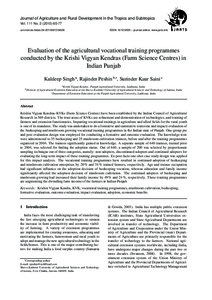| dc.date.accessioned | 2011-10-11T12:26:52Z | |
| dc.date.available | 2011-10-11T12:26:52Z | |
| dc.date.issued | 2011 | |
| dc.identifier.issn | 1612-9830 | |
| dc.identifier.uri | urn:nbn:de:hebis:34-2010091334536 | |
| dc.identifier.uri | http://hdl.handle.net/123456789/2010091334536 | |
| dc.language.iso | eng | |
| dc.publisher | Kassel University Press | ger |
| dc.rights | Urheberrechtlich geschützt | |
| dc.rights.uri | https://rightsstatements.org/page/InC/1.0/ | |
| dc.subject | Krishin Vigyan Kendra | eng |
| dc.subject | KVK | eng |
| dc.subject | vocational training programmes | eng |
| dc.subject | mushroom cultivation | eng |
| dc.subject | beekeeping | eng |
| dc.subject | formative evaluation | eng |
| dc.subject | outcome evaluation | eng |
| dc.subject | impact evaluation | eng |
| dc.subject | adoption | eng |
| dc.subject | economic benefits | eng |
| dc.subject.ddc | 630 | |
| dc.title | Evaluation of the agricultural vocational training programmes conducted by the Krishi Vigyan Kendras (Farm Science Centres) in Indian Punjab | eng |
| dc.type | Aufsatz | |
| dcterms.abstract | Krishin Vigyan Kendras-KVKs (Farm Science Centres) have been established by the Indian Council of Agricultural Research in 569 districts. The trust areas of KVKs are refinement and demonstration of technologies, and training of farmers and extension functionaries. Imparting vocational trainings in agriculture and allied fields for the rural youth is one of its mandates. The study was undertaken to do a formative and summative (outcome and impact) evaluation of the beekeeping and mushroom growing vocational training programmes in the Indian state of Punjab. One-group pre and post evaluation design was employed for conducting a formative and outcome evaluation. The knowledge tests were administered to 35 beekeeping and 25 mushroom cultivation trainees, before and after the training programmes organized in 2004. The trainees significantly gained in knowledge. A separate sample of 640 trainees, trained prior to 2004, was selected for finding the adoption status. Out of 640, a sample of 200 was selected by proportionate sampling technique out of three categories, namely: non-adopters, discontinued-adopters and continued-adopters for evaluating the long-term impact of these training programmes. Ex-post-facto one-shot case study design was applied for this impact analysis. The vocational training programmes have resulted in continued-adoption of beekeeping and mushroom cultivation enterprises by 20% and 51% trained farmers, respectively. Age and trainee occupation had significant influence on the adoption decision of beekeeping vocation, whereas education and family income significantly affected the adoption decision of mushroom cultivation. The continued adopters of beekeeping and mushroom growing had increased their family income by 49% and 24%, respectively. These training programmes are augmenting the dwindling farm income of the farmers in Indian Punjab. | eng |
| dcterms.accessRights | open access | |
| dcterms.bibliographicCitation | In: Journal of Agriculture and Rural Development in the Tropics and Subtropics. Kassel : Kassel University Press. - Vol. 111, No. 2 (2010), S.65-77 | |
| dcterms.creator | Singh, Kuldeep | |
| dcterms.creator | Peshin, Rajinder | |
| dcterms.creator | Saini, Surinder Kaur | |
| dc.description.everything | Gedruckte Ausg. im Verlag Kassel Univ. Press (www.upress.uni-kassel.de) erschienen. | ger |

